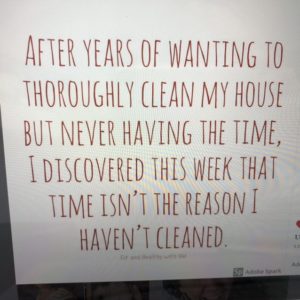When news of the pandemic sunk in, I didn’t immediately think, “Oh, no! That means I’ll be mopping the floor and cleaning my own toilets. But in the post-apocalyptic world, house cleaning is part of the Zeitgeist.

“I’m trying to figure out how clean the toilet without sticking my hand in,” Marge says today, when I ask how she’s doing. We speak every few days. She has been “sheltering” in her New York City apartment since March 4 when she celebrated her 102nd birthday. As in my Florida building, no visitors are permitted.
“I told Sati I’m saving the dirt for her,” Marge says, with her trademark wit. “But I changed my sheets — the bottom one is the hardest. And I wash out my tee shirts every night after wearing them. I put ammonia in the toilet, hoping that will do the job. We’ll see…”
“Don’t you have a toilet brush?” I ask, a little sheepishly. Marge and I have had conversations about how much she does for herself, but I never expected to be asking about her toilet brush!
She has one but can’t find it. Hearing this, I immediately log on to Amazon. “I’ll order one for you online,” I explain.
She’ll have a new toilet brush and a long-handled tub wand by Friday. A late birthday present, I joke.
She laughs. “This is the best birthday present I’ve ever gotten! I mean it!”
It seems that the conversation has turned to housework — doing it, catching up on it, hating it.
I hasten to say before I continue on this theme: This unexpected “effect” is felt most acutely by people who have paid others to do chores they can’t or don’t want to do. Full disclosure: I am one of them.
You might think it frivolous to give air time to what is clearly a luxury problem. Poor me, I have to do my own vacuuming. But be assured: We newly-housebound are musing more than complaining. We are fully aware that the real victims are the domestic workers we once employed.
And yet, as we live out our lives in isolation, we can’t help but feel a little sorry for ourselves, too. Perhaps all this talk about cleaning and random household tips reflect an odd and unexpected kind of social bonding.
To wit, a group of globe-trotting, uber-privileged female friends who grew up outside the United States are talking via WhatsApp about life without “the maids.” They discuss the relative virtues of old-fashioned rag mops. They recommend cleaning products to one another.
A college friend in Manhattan calls me in Florida: “Can you explain how to use a Swiffer Wet Jet?” (Ironically, I researched and wrote about Swiffer in my 2009 book, Consequential Strangers; see BONUS READ below.)
I “show” her the Wet Jet features via Face Time. Hers turns on, which means the battery is working. However, the bottle of cleanser is missing from the handle. She’ll call her house cleaner. In the meantime, every site we search, including Proctor and Gamble’s, is out of stock. Apparently, toilet paper isn’t the only thing Americans are hoarding.
My friend later posts on Facebook:
“…struggling with figuring out my Swiffer. Who knew it was so counter-intuitive? And forget about getting the liquid soap. Thanks, Melinda Blau and [another friend] who have been helping me.
I know I have been lucky having a part-time housekeeper (love you, [housekeeper’s name]) and now I really have extra respect for the work she does. Why is it that I can clean for hours and it still doesn’t look at good as when she does it?
Her Facebook friends rush in with answers and advice:
Because you are using stain remover for clothes to clean bath tub lol trying to get you Lysol and send if I can find ❤
Use Soft Scrub for toilet and hand bowl. Comet or Ajax for bathtub interior.
I have the same problem. Can’t get the hang of the Swiffer or housework in general. Exhausting and never ending!
7th Generation & Biokleen are my top picks for cleaners, they are safer ingredients and work! Whole foods has their label for liquid soap $9. gets you a whole jug!
I agree. And they’re cruelty-free.
I am obsessed with Clorox wipes.
Pre-pandemic, I regularly cleaned out my apartment — got rid of clothes and clutter, emptied the catch-all drawer in the kitchen. I even wrote about it, likening the process to “human molting.” But it’s not the same as cleaning.
Sweeping cement dust off my tile balcony, a job I used to leave for the crew that blitzes my house every two weeks, I think to myself, I’m not that good at this!
I am not alone. A random search of #housecleaning on Instagram turned up this “poster” by Val Lacy, a youthful, fit personal trainer who undoubtedly has the stamina but perhaps not the stomach for cleaning:
Let’s face it. While cleaning projects might be “therapeutic” to some, there’s not much to be said in favor of housework — certainly, not the way it’s defined by feminist writer Dana Tortorici:
A catchall term for everything that women do in the home, housework is invisible work. Not only performed behind closed doors, it is endless — done one day to be redone the next, with nothing to show for itself but the material refuse of ordinary life.
And yet, here we are, women and men, doing our own toilets and floors. I suspect that in a world gone haywire, one of the reasons we’re chattering on about housework is this: It’s one of the few things we can still control. A friend in Sante Fe told me that one of his clients found “comfort” polishing her silver. For others, the steady drone of the vacuum offers reassurance. I’m still here.
I asked Marge to call me after she tried out the new bathtub wand. I might order one for myself.
♦♦♦
BONUS READ
SWIFFER and ME. One of my favorite pieces in Consequential Strangers is “The Swiffer Story,” about the top-secret project known as “Mop 2000.” No one — or very few of us — likes to clean floors. We owe a debt to Craig Wynett, a creative Procter and Gamble executive who challenged his staff to come up with “a better way to mop.” As the design began to take shape, the new cleaning tool was nicknamed “the maxi-pad-on-a-stick.”
The Swiffer story illustrates the importance of sharing ideas across boundries. The concept was co-conceived by P &G employees from entirely separate divisions: scientists who concoct hard-surface solutions (cleansers) for the company and engineers who develop non-woven materials used in diapers and maxi-pads. They also combined forces with marketing and advertising people, as well as getting consumers’ input. Twenty years later, it’s hard to find someone who hasn’t at least tried a Swiffer.
We’re all developing and/or rediscovering new/ old talents and abilities. It’s nice to read something that is not about death and illness statistics.
When I was a kid the statement “ I’m bored” was met by my mother with a list of chores to be accomplished. Then it was a punishment, now it’s a goal, something to be achieved and to take one’s mind off the solitude. I love my solitude, but a purpose for the day gives it some structure beyond contemplation and Netflix binging.
Reading is fabulous, but a little housework provides problem solving and physical challenges to be met.
It also makes us aware and grateful for the services which have been rendered to us over the years.
Thanks, Greg, for such a thoughtful and thought-provoking comment. I will now think of housework as a challenge, not a chore!
Not sure if those two words , in context, aren’t sounding synonymous
You mean “chore” and “challenge.” Yes, you’re right!
I appreciate the work my housekeeper does now more than ever!
No kidding! I know so many people who have long-term relationships with housekeepers and always appreciated them, but NOW they’re really grateful!
Melinda, our mutual acquaintance “J” thought I would enjoy your blogs and I sure do! Your insight and humor makes me smile 🙂
I find cleaning is therapeutic especially with my favorite music on. There is also a hint of the obsessive compulsiveness need to have the kitchen wiped down and dishes done before I think about going to bed at night!
Tracey, welcome. Glad you liked this. I’ll keep at it then…